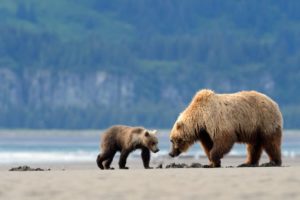What Will Happen to Wildlife in the Trump Era?

The Trump administration is no friend to humanist values. Already, the president has made clear his preference for dogmatism over secular rule of law, his disregard for the role of science in shaping policy, and his belief that nationalism and ethnic background are the basis for measuring our obligations to one another. Other groups will indirectly struggle under these policies as well—one being wildlife. The wildlife and ecosystems of the United States face significant pressures from the Trump administration due, in part, to a disbelief in science, aggression toward minority communities, and specific economic agendas.
Earlier this month Trump overturned a 2016 US Fish and Wildlife Service ban on hunting tactics considered to be cruel: killing families of wolves and hibernating bears in their dens, live trapping, and aerial hunting. The ban sought to eradicate these approaches in order to preserve the biodiversity of federally owned wildlife refuges in Alaska. Many fear that repealing the protections laid out in the ban will open doors for the Alaskan Board of Game to prioritize the preservation of moose, elk, and deer species over the predators that rely on them in order to service human hunters. Under the repeal, there will be no safe place for bears and wolves to hide in federal refuges. “This isn’t hunting—it’s slaughter,” says Brett Hartl, government affairs director at the Center for Biological Diversity. “Repealing these protections also undermines the critical role predators play in healthy ecosystems.”
Speaking of healthy ecosystems, Trump’s proposed border wall will also significantly impact the wildlife in its surrounding area (among issues rooted in racial, social, and economic injustice). Last week the Center for Biological Diversity and US Rep. Raul Grijalva filed a federal lawsuit against the Trump administration calling for the Department of Homeland Security to prepare a report on the environmental impact of the proposed border wall and the border enforcement program. Outside magazine, using information from the US Fish and Wildlife Service, reported that over 100 endangered or threatened species could be blocked from their migration routes and critical resources like water. Sergio Avila-Villegas, a scientist from the Arizona-Sonora Desert Museum, told BBC’s Science in Action team that “Border infrastructure not only blocks the movement of wildlife, but…destroys the habitats, fragments the habitats and the connectivity that these animals use to move from one place to another.”
To make matters worse, a variety of bills seeking to weaken the Endangered Species Act (ESA) have been introduced since January. Since the ESA’s implementation in 1973, many species that were once close to extinction have made a significant comeback. But now that the majority of our most powerful political leaders reject science and the reality of climate change, even calling it a hoax, natural habitats and the wildlife that rely on them are once again gravely threatened.
All of this comes at a time when the United Nations is beginning to recognize healthy ecosystems and biodiversity as a human right. UN Special Rapporteur John Knox told the Huffington Post, “Biodiversity is really necessary for the full enjoyment of rights to food, water, health—the right to live a full and happy life.” Biodiversity is invaluable to us. It’s responsible for clean water, the absorption of harmful chemicals, disease prevention, and providing us with oxygen to breathe. However, human activities have greatly disturbed ecological and genetic diversity on this planet. An assessment estimates that humans have sped up the rate of species extinction to roughly 1,000 times. And the World Wildlife Fund reports that 67 percent of wildlife on earth could vanish by 2020. Because of this, scientists have warned that we are currently undergoing a great mass extinction event.
Biodiversity is essential to maintaining the delicate balance of life on this planet. Now more than ever it is vital to address the economic and political interests that have allowed our influential representatives to disregard and lay waste to other species, to science funding, and our own futures. Although it may be too late to completely reverse the great extinction, it is deeply humanistic to extend our advocacy to measures that preserve our ecosystems and their inhabitants.
